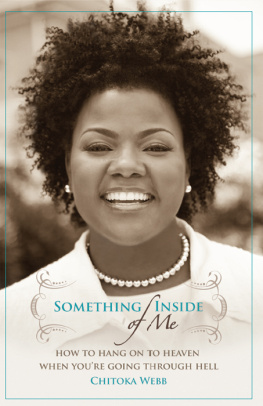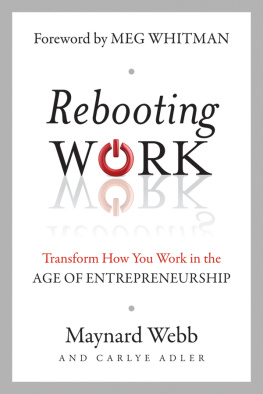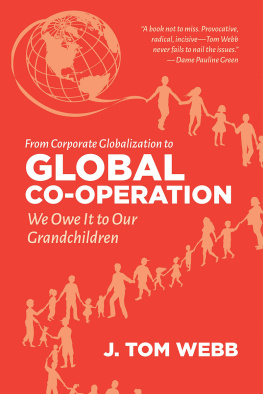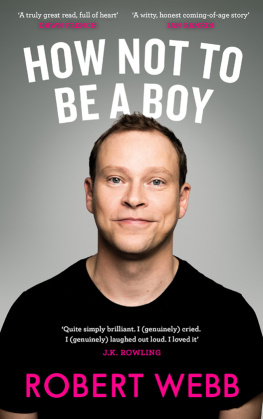This memoir is a factual account according to the authors recollections. Some names and identifying details have been changed in order to protect the privacy of individuals.
Published by Emerald Book Company
Austin, TX
www.emeraldbookcompany.com
Copyright 2011 Chitoka Webb
All rights reserved.
No part of this book may be reproduced, stored in a retrieval system, or transmitted by any means, electronic, mechanical, photocopying, recording, or otherwise, without written permission from the copyright holder.
Distributed by Emerald Book Company
For ordering information or special discounts for bulk purchases, please contact Emerald Book Company at PO Box 91869, Austin, TX 78709, 512.891.6100.
Design and composition by Greenleaf Book Group LLC
Cover design by Jay Arnold, iDesign Inc. www.iDesignInc.net
& Greenleaf Book Group LLC
Photography by Kris DAmico www.krisdamico.com
LCCN: 2011931058
Ebook ISBN: 978-1-934572-95-5
Ebook Edition
C ONTENTS
I NTRODUCTION
Life is not perfect. We all make mistakes and encounter problems. In Something Inside of Me, I share the details of how I turned my mistakes and obstacles into miracles.
After suffering heart-wrenching experiences such as growing up in poverty, not graduating with my high school class, and being diagnosed with a debilitating disease, I discovered as I triumphed over each trial that there was one thing that was constant, true, and lovingthere was something inside of me.
You may receive a hit so hard that it knocks you off your feet. My book offers you the inspiration and strength to get back on your feet and move forward with more direction and enthusiasm than before. I present the tools and lessons needed to remove the barriers that are blocking your path to fulfillment and success in life. I help you tap into something inside of you to help you triumph over the challenges you encounter.
My message is universal. We all hurt. We all cry. We must learn that if we can make it once, we can make it twice; if we can overcome disappointment once, we can overcome it twice. Holding on to heaven when we are going through hell can empower us to recover because of something inside of me and something inside of you.
1
T HE W ISDOM OF G ROWING U P
The day the child realizes that all adults are imperfect, he becomes an adolescent; the day he forgives them, he becomes an adult; the day he forgives himself, he becomes wise.
Alden Nowlan
Most of the lessons I learned in life were birthed during my early years growing up in the Preston Taylor housing projects located on the west side of Nashville on Clifton Avenue. Preston Taylor was one of Nashvilles most powerful black leaders in the early 1900s. He was a businessman, an undertaker, and an influential minister. The projects were named in his honor due to countless acts of kindness and the numerous contributions that he made to the community throughout his life. I lived there from 1974 to late 1980. While the community was riddled with crime and low-income families, you could always find the spirit of sharing: either someone was knocking on your door to borrow a cup of sugar or you were knocking on their door to return the favor.
Hi Mrs. Helen, I said, looking up toward the sky. Mrs. Helen was a large woman standing at six feet tall; she was also a woman with a big heart. Hey baby, where your momma? she said, leaning down and smiling at me. Shes washing my sisters hair, we got to go back to church, I said, my hands now slippery from twirling my hair around my fingers. My hair was freshly pressed and I could not resist. Well, tell your momma I said thank you for letting me use her phone last night. I baked yall a cake this morning. Everybody loved Mrs. Helens cakes. Now take it in there and set it on the kitchen table, and leave the wrapping on it. Thatll keep it fresh, she said as she passed the cake off to me. As I walked to the kitchen the smell of warm flour and Coca-Cola sure made it tempting to lift the wrapping and lick the chocolate icing stuck to the paper. Rising early to the sweet smell of fried bacon and eggs and the thumping sound of gospel music was a ritual. When I woke up, my first taste of joy was seeing my mothers face: a twenty-seven-year-old, brown-skinned woman with a medium frame and a beautiful smile.
Did you thank God for allowing you to see another day? my mother asked as she shook the skillet to make sure the fried eggs didnt stick.
Yes, maim, eased out of my mouth as I yawned last night away.
The cool aluminum dining table felt like a breath of fresh air on my warm face as I folded my arms and rested my head.
Toke, why are you squirming around in the chair? she said as the timer on the toaster buzzed.
Momma, the plastic on the seat is torn and its scraping my butt. Since I was only four years old, it never dawned on me that I could move to another chair.
Why dont you sit in the good one? She followed this with a wink to let me know that as bad as I thought it was, everything was okay.
My mother always made us feel like earth had no sorrows that heaven couldnt heal. She had a quote for every situation, including Every day you wake up, you got another chance. All were her way of saying that things are never as bad as you think they are. She taught me and my two sisters early on how to make do with what we had when things ran low toward the end of the month. With her wisdom we became experts at supplementing what we had. On occasions when there was not enough money for orange juice, my sisters and I would put sugar in water. We definitely knew the difference. The orange juice was nice and smooth, especially when chilled, but sugar doesnt dissolve well in cold water no matter how much you stir. There was always the residue of small chips of sugar floating around in the glass. After each sip of this juice substitute, I could feel loads of sugar slowly dissolving on the back of my tongue. Oh! We were young, but we learned early on how to make a way out of no way.
We would douse our toast with government-issued peanut butter that came in a shiny silver can. The heck with complaining about not having grape jelly. This substitution regime was not only for food; it included games as well. No checker and monopoly gamesno worries we thought. Get a piece of chalk and draw hopscotch squares on the ground. Every item in our house was made for more than one use. The dish rag would serve as a flyswatter when the flies didnt get the message that they were not welcome. Having to live with the little brown cockroaches was enough! The milk jug had nine lives: Once the milk was gone, it became the Kool-Aid jug, water jug, or a jug for any liquid concoction we came up with. If there wasnt enough money for Barbie dolls, we would dress up in our mothers clothes. We did not discriminate. If we wanted an afro, we would slap on a jerry curl bag while listening to the healing sound of Marvin Gaye. We understood that what we could not have in real life we could have in our imagination. If we wanted the long-hair look, we would slap on a pillow case and slide across the floor to the raspy sound of Diana Rosss Aint No Mountain High Enough. At that time, it was every little black girls fantasy to have long hair and different colored eyesany color but black or dark brown.
Even though we were poor, we did not know it because there was always a backup plan. It was as if everyone in the projects was born with a genius gene. It seemed embedded in our minds. But now I realize it wasnt embeddedit was taught. It was all passed down from one generation to the next. Most of these archived lessons originated from poor relatives or other people. Each generation tutored the other. There were certain things in our house that were not to be touched. For instance, if a couch had plastic on it that meant dont sit on it! Just look at it, but dont touch it. However, when we went to my aunts house, she had two couches: the one you could sit on and the one that had plastic on it. At my grandmothers house, she had an entire living room suite that was smothered in plastic a quarter-inch thick.












